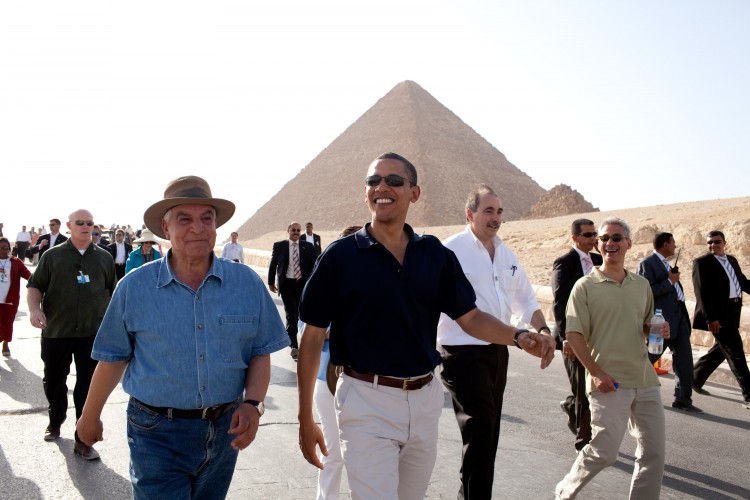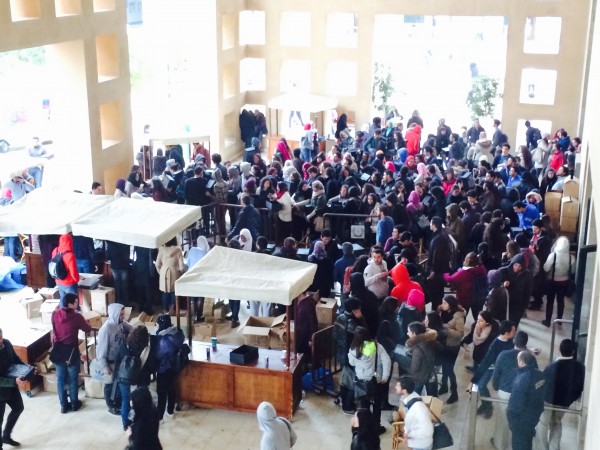Zahi Hawass: ‘Egyptians could rule the world’
BY ENGY ALY
@ENGYALY7
![Zahi Hawass (left) and US President Barack Obama touring the pyramids of Giza in 2009 [Labeled for reuse off Wikipedia]](http://www.auccaravan.com/wp-content/uploads/2015/12/Hawass-with-Barack-Obama-Labeled-for-reuse-off-wikipedia-e1449439422413.jpg)
He has been raising awareness about Egyptology and the preservation of Egypt’s heritage as a world-renowned tourist destination.
As an Egyptologist and former minister of antiquities in 2011, Hawass has both been praised and come under fire for his association with the Mubarak government.
Hawass was investigated by Egyptian authorities in 2014 on charges of illicit gains; he was later cleared.
He now travels the world to give talks about Egyptology and the pharaohs.
The Caravan talked to Hawass to learn more about Ancient Egyptian civilization and how it differs from modern day Egypt.
What were the Pharaohs’ most striking traditions?
I would say that the most important thing for the Ancient Egyptians revolved around building the tombs for the kings, which all goes back to building the Pyramids.
Therefore, all Egyptian men and women from the south of Egypt participated in building the Pyramids by sending workforces and food to help the King. And therefore, building the Pyramids built Egypt, and that is why I think that building tombs is their most striking tradition.
Are there any social norms or traditions that have carried over to today?
Actually, before the TV entered Egypt, before 1960, all the farmers’ behaviors were exactly like those of the Ancient Egyptians. And even if you look at the scenes on the tombs, you would find that these tombs were present in modern Egypt before the 1960s exactly.
But gradually, with the TV, most of those social norms or traditions died out. We still mourn the dead for 40 days after their death, and we are the only Muslim country in the world that does that, because it was practiced during Ancient Egypt, where the mummification process continued for 40 days.
The second important thing is that, for example, when a man does Hajj, he comes back and says “I finished what I need to do in the world; now I can die happy.” This is taken from the time of the Pharaohs, but the difference is when a king finished his tomb, he would say he could now die happy.
The king would celebrate in something called the “sed” festival, where he would hold a flyer, wear a skirt, and dance. This would indicate that the king finished all the requirements that the gods asked him to do in order to become a god.
What role did religion play during their time, how is it different from now?
Of course religion of the Ancient Egyptians was very important because they worshiped many different gods. Every god had a function. There was a monkey dog for example. They would also worship cows, not really worship, but admire its beauty and love, and what it provided for them.
They also had a universal god called Amon Ra. So they had a main god but also had minor different gods for writing, for example, justice, for the moon, for everything. But when anyone doesn’t follow their religion at the time, they hated them. For example, Akhnaton, during his 17 years of ruling, said there was only one god behind the sun, and they hated him for that, because he changed the religion.
So, of course, there is a big difference between their religious practices and ours today. We believe in one God, Muslims, or Christians, or Jews. The ancient Egyptians did not know the one God before Akhnaton and when he died, they returned back to the dogma of Ammon.
What are the differences between their educational system and ours?
Education wasn’t for everyone at that time. People who were educated were educated inside the temples. Education was very little, and that is why the most important person at that time was the scribe.
During the time of building the pyramids, Egyptians were around three million, and only around 100,000 were educated. The rest were peasants, farmers, or workmen.
In terms of language, what are some words that have carried over from the Pharaohs’ civilization?
There are many words that have carried over but of course I can’t remember all of them now. Vegetable sellers on the streets now call out “werwer ya gargeer” to promote their kale, without even knowing what “werwer” means, and that it’s a word from ancient Egypt meaning “fresh.”
Other than the words, some of the cities also come from Ancient Egyptian origin; Damanhoor for example, is De- me-en-hor, meaning the god Horus’ city.
There’s an Arabic book called Egypt’s Ancient History by Abdelaziz Saleh, which has a list of the vocabulary words that were present during our Ancient Egypt that we still use today.
If the Pharaohs were still living now, what do you think they would prioritize in terms of innovation?
Let me explain something: the most important thing to them was their national project, which is building tombs for kings in order for the king to become a god.
Therefore, this was the most important thing that was shared among Ancient Egyptians. Households in the Delta sent kings workmen in order to help them do that, so they paid the workforces by giving them bread or grains, and in return they didn’t pay taxes.
Therefore, their main focus was the national project, not gaining more commodities (since they didn’t have money), like our main focus is now.
What were their marital traditions? How are they different or similar to now?
Egypt is the only country in the world where the woman writes a furniture inventory and that was actually adopted from our ancient civilization.
Also similar is the way a relationship developed back then. The girl fell in love, wrote love poems and received love songs or poems from her partner. Couples would also go out on dates as well.
As for marriage, there was a contract between any married couple and there were also witnesses for this contract just like there is now. I also wrote a book that encompasses this topic called Silent Images: Women in Pharaonic Egypt.
What about their family dynamic? Was patriarchy always present in Egypt, for example?
In Ancient Egypt, they drew the roles of men and women. Men used to work as farmers, go to the farm to pick the food for their families, or go to their daily jobs, while women stayed home to become a housewife. Some women also educated their children at home.
If a woman fulfilled her role as a housewife and has some time on her hands, she could work as a lawyer, a teacher, a judge, or anything else. The difference is women nowadays neglect their children and go to their jobs instead.
In Ancient Egypt, women were really cherished and were considered the most important family dynamic, because as they used to say, a king could never rule without his woman.
Therefore, the Ancient Egyptian civilization gave women everything because they were the ones who raised the men who built the Pyramids; they were the ones who made Ancient Egypt civilization the most profound in the ancient world because of its righteous society, not like the sick society we live in now.
What were their social issues and how are they different than ours today?
People back then did not really think about what we think about now. Every single man had a job, and the social classes were made based on the tombs.
For example, if someone was rich, they would be buried with their gold and their belongings, and if a person was poor, they wouldn’t be buried with such things. Poor people were convinced and satisfied with their lives, not like now.
Did any revolutions happen back then?
Of course there were many revolutions. For example, in the end of the Ancient Egyptian civilization, there was a wise man named Ipuer. Ipuer used to always tell the king that there was corruption going on and that some people are too poor that they can’t afford food, but the king didn’t do anything about it, so a revolution happened.
Ipuer explained that the revolution happened because the rich were becoming poor and the poor were becoming rich. For example, he said that the woman who used to look at the water to see her face, has a mirror now.
Ipeur also explained that the king during that time ruled for 80 years, because he started ruling when he was eight. Therefore, the people surrounding him were practically the ones ruling and that’s why I always compare this revolution with the January 25th revolution in 2011.
Then there was a plot against King Ramses III, where there was the first workmen strike in history. The government did not give the workmen their salaries, so the workmen broke into the government’s safe to try to rob it.
Also, his wife and his son made a conspiracy against him and killed him. In the 20th family, there was also a third revolution where the people went into the Karnak Temple to demonstrate there.
How would you define who we are as Egyptians?
There are many theories about that. One theory was that the Egyptians were semitic and hamitic, meaning they immigrated from Africa and Asia and settled in Egypt.
There was another theory that the origin of Egyptians was from the Negro, which is completely wrong.
I personally believe that the Egyptians were Egyptians, they were made here in Egypt and they are the ones who brought about the Ancient Egyptian civilization.
Yes we are Muslim, and we speak Arabic, but we are not Arab. Also, we always needed and will always need a national project to unite us, for example there was the building of the Pyramids, then the high dam, and then the Suez Canal.
If I told you to describe Egyptians in two words, what would they be?
The Egyptian people are unique, and they are smart. If they really use this, they could rule the world.




